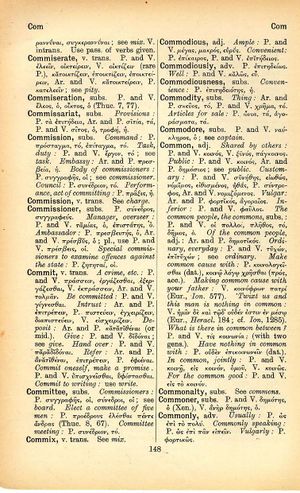common: Difference between revisions
Ξενία χαλεπὴ κατὰ πολλοὺς τρόπους → Gravis res multimodis peregrinatio → Die Fremde (Gastfreundschaft) ist in vieler Hinsicht eine Last
m (Woodhouse1 replacement) |
mNo edit summary |
||
| Line 17: | Line 17: | ||
of the [[common people]], adj.: [[Aristophanes|Ar.]] and [[prose|P.]] [[δημοτικός]]. | of the [[common people]], adj.: [[Aristophanes|Ar.]] and [[prose|P.]] [[δημοτικός]]. | ||
[[ordinary]], [[everyday]]: [[prose|P.]] and [[verse|V.]] [[τυχών]], [[ | [[ordinary]], [[everyday]]: [[prose|P.]] and [[verse|V.]] [[τυχών]], [[ἐπιτυχών]]; see [[ordinary]]. | ||
[[make common cause with]]: [[prose|P.]] [[κοινολογεῖσθαι]] (dat.), [[κοινῷ λόγῳ χρῆσθαι]] ([[πρός]], acc.). | [[make common cause with]]: [[prose|P.]] [[κοινολογεῖσθαι]] (dat.), [[κοινῷ λόγῳ χρῆσθαι]] ([[πρός]], acc.). | ||
Revision as of 08:33, 5 June 2020
English > Greek (Woodhouse)
adjective
shared by others: P. and V. κοινός, V. ξυνός, πάγκοινος.
public: P. and V. κοινός, Ar. and P. δημόσιος; see public.
customary: P. and V. συνήθης, εἰωθώς, νόμιμος, εἰθισμένος, ἠθάς, P. σύντροφος, Ar. and V. νομιζόμενος.
vulgar: Ar. and P. φορτικός, ἀγοραῖος.
the common people, the commons, subs.: P. and V. οἱ πολλοί, πλῆθος, τό, δῆμος, ὁ.
of the common people, adj.: Ar. and P. δημοτικός.
ordinary, everyday: P. and V. τυχών, ἐπιτυχών; see ordinary.
make common cause with: P. κοινολογεῖσθαι (dat.), κοινῷ λόγῳ χρῆσθαι (πρός, acc.).
making common cause with your father: V. κοινόφρων πατρί (Eur., ion. 577).
'Twixt us and this man is nothing in common: V. ἡμῖν δὲ καὶ τῷδ' οὐδέν ἐστιν ἐν μέσῳ (Eur., Heraclidae 184; cf. Ion, 1285).
what is there in common between? P. and V. τίς κοινωνία; (with two gens.).
have nothing in common with: P. οὐδὲν ἐπικοινωνεῖν (dat.).
in common, jointly: P. and V. κοινῇ, εἰς κοινόν, ὁμοῦ, V. κοινῶς.
for the common good: P. and V. εἰς τὸ κοινόν.

